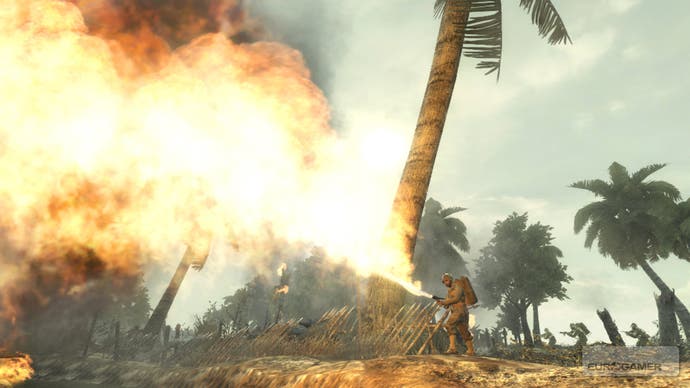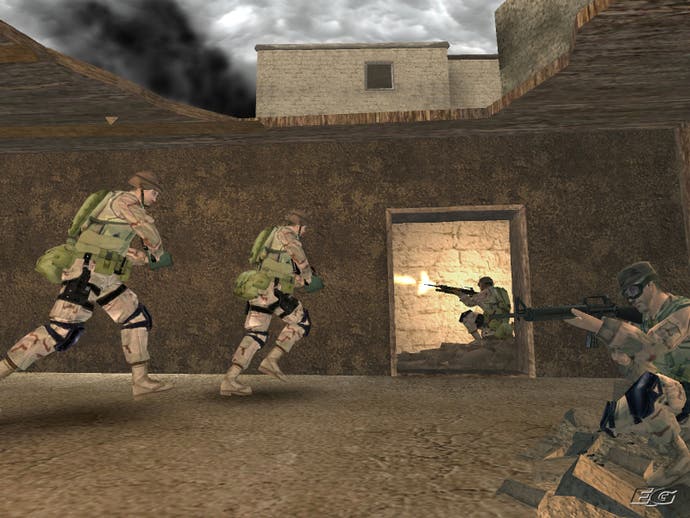Play Fighting
What is it good for?
There's nothing wrong with playing soldiers, is there? Time was that schoolboys would run around the playground, making akka-akka-akka machine-gun noises and arguing about who would be the Germans. But we're not schoolboys, and the modern first-person shooter offers a much more realistic and immersive experience than playground games.
These shooters are ostensibly made for adults. But if you take a step back and look at the scene dispassionately, the idea of grown-ups entertaining themselves by pretending to slaughter each other on virtual representations of actual battlefields is pretty creepy. Orwellian, even. And still enormous fun. So we find ourselves back in the Contradiction Cul-de-sac.
Part of the problem is these games take themselves so seriously. The FPS has been slowly but inexorably pulling itself in two contradictory directions at once, ever since the first Medal of Honor game (produced by Steven Spielberg to piggyback on Saving Private Ryan, no less) pioneered this current trend for combining bloodthirsty excitement with a sombre "war is hell" message.
Battlefield and Call of Duty soon followed, while the likes of Counter Strike and Rainbow Six brought the same approach to modern-day combat. Now, the genre is stuck, ricocheting awkwardly between gritty realism and ludicrous cartoon violence.

The trouble is, when it comes to games, war isn't hell. With joypad in hand, war is frickin' awesome. It has to be. The average soldier rarely gets to fire their weapon, let alone make a confirmed enemy kill. Yet in games you mow down hundreds of foes in story mode, thousands more during your online career. You have to. That's the game.
When World at War ends with stark messages about the human cost of a war you just won pretty much single-handed, before offering you the chance to play Nazi Zombies, the message is inevitably garbled - tripping over itself to be respectful and pump-your-fist awesome at the same time. Only niche titles like Armed Assault and Operation Flashpoint have tried to find gameplay satisfaction in a virtual battlefield where anything like real-world rules apply, where combat is considered and death is sudden, costly and scary.
As gamers, our perception of these things is skewed. By way of illustration, games journo turned telly man Charlie Brooker did an excellent interview with industry publication MCV last year where he talked about using violent games footage in his Gameswipe special for the BBC.

"Let's not beat about the bush - it's f***ing tasteless," he said, describing the relentless carnage in Call of Duty: World at War. "There's a line where I say I enjoy it, but I wouldn't necessarily want to let people watch me enjoying it."
That cuts very close to the heart of my own unease with the direction these games are taking. I've lost count of the number of times my wife has walked in on me mid-game, only to be greeted with sprays of digital blood. As gamers, we take for granted actions and images that most other people would be horrified by. Headshots. Dismemberment. Instinctively shooting the red barrel to set people on fire.
We perform these deeds hundreds of times without thinking about what they actually represent. Taken out of a fantasy context and placed in a real-world scenario, the meaning of these actions changes. And yet we still get so defensive whenever questions are asked about the content of such games.
